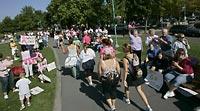Sense of purpose propels Breast Cancer 3-Day walk

They wore pink. From their fuzzy boas to their baseball caps and Mardi Gras beads, pink was everywhere. Even electric-pink hair dotted the crowd of walkers.
For Karen Libby, who wore a pink tank top, earrings and a straw cowboy hat, the splashes of pink sent one message: Think about breast cancer.
Libby, 44, had a mastectomy six years ago.
And to make her statement, Libby walked Friday with her husband and about 2,700 other people in the first day of the Breast Cancer 3-Day walk.
The walkers raised $6.9 million for research, community outreach and treatment, said Nancy Mercurio, spokeswoman for the walk. They gathered pledges, solicited donations and held fundraisers to bring in the money, which will benefit the Susan G. Komen Breast Cancer Foundation and the National Philanthropic Trust.
The walk kicked off Friday morning at Marymoor Park in Redmond and set up camp at a Kirkland park. Today walkers will loop through Bothell, Woodinville and Kenmore, then head back to the Kirkland camp site. Sunday, they will head north to Kenmore and around the lake to the University of Washington.
On Friday, the group of predominantly female walkers chatted on park trails as supporters and crew members on the sidelines clapped and cheered. Cars honked and bicyclists waved at the long line of women who snaked through city streets.
Team names like "Simply the Breast" and "Walkers for Knockers" kept the atmosphere upbeat.
"It's addictive to be here. You just buzz up with energy," said Tina Fomenoff, 29, of Bellevue.
"It makes you feel so much like there's hope," said Gretchen Melton of Renton. The 40-year-old cancer survivor walked with a friend who was undergoing chemotherapy for her second bout of cancer.
"There's just that female camaraderie," she said.
Participants walked in memory of family members, friends, co-workers and people they didn't even know. They wore T-shirts bearing pictures of women too sick to walk and the names of people who battled cancer.
Breast cancer is the second leading cause of cancer death among U.S. women, after lung cancer. More than 200,000 people are diagnosed and an additional estimated 40,000 die from it each year, according to the American Cancer Society.
Many walkers said the experience — one of a dozen such walks nationwide — was "overwhelming," and their eyes welled up with tears as they talked.
For Jayne Collins, 45, the 60-mile trek wouldn't have been possible a year ago.
Last summer, Collins was undergoing chemotherapy, and was feeling rundown and nauseated.
But one week that July, when she was driving home from a friend's house, she said she saw a "wave of pink" coming toward her. The women wearing pink T-shirts for last year's Breast Cancer 3-Day inspired her to walk this year, she said.
"I sat in my car and cried like a baby," she said.
On Friday, she kept a packet of tissues in her right pocket and a couple more stored inside her backpack.
For Libby, the walk was a chance to reflect on her experience and move forward, she said.
Libby, whose 70-year-old mother was also diagnosed with breast cancer about two weeks ago, has recovered after a mastectomy and chemotherapy that made her hair fall out and her skin turn grayish.
"You don't feel sick, you don't look sick and all of a sudden you have drugs that are making you sick," she said.
She walks so that her 15-year-old daughter won't have to go through what she went through, she said.
Although Libby's tumor was removed six years ago, life still hasn't returned to normal, said her husband, Mark.
Even when his wife has normal pains, he worries that she has cancer again.
This is his third year walking with her at the event.
"It's a way to deal with it," he said.
He wishes more men would walk.
"It's a team battle when someone goes through something like cancer," he said, and support shouldn't end when the women are done with their treatments.
Collins hopes breast-cancer awareness expands beyond this group of women. For that to happen, the public — including men — needs to overcome embarrassment when talking about breasts, she said.
"Let's hope that all these efforts actually pay off in the long run," Collins said.
Anne Kim: 206-464-2591 or akim@seattletimes.com
This story includes information from Seattle Times archives.